A Story With A Rhyme: An Interview With Aisha Franz
by Georgia Webber
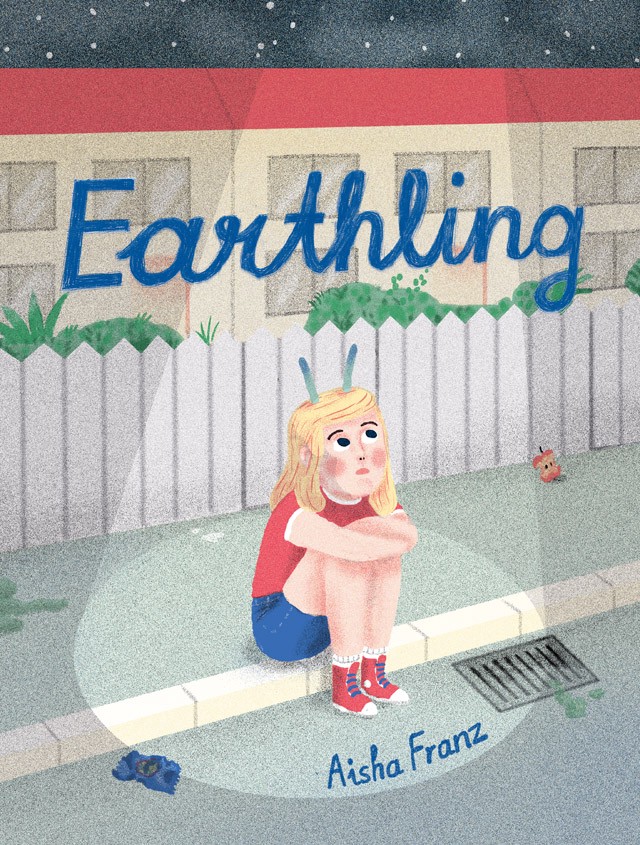
Interviewing is a great way to discover how much communication happens in between words, particularly in the ‘uh, um’ moments, knowing nods, and nervous laughter. My conversation with German artist Aisha Franz included many of these moments; her, speaking her third language (German first and Spanish second) and me, realizing that my native language habits are far from flattering despite 25 years of practice.
The pages of Earthling, her first English release (out with Drawn & Quarterly), are equally distributed between three women: Mädchen, a young girl who finds and experiments with an alien friend; her older, nameless sister as she snips, fucks, and smokes what innocence remains from her not-so-distant childhood; and their unnamed mother, facing her manifest regret in the form of an alternate, more successful self.
These women are inside out, confused about it, struggling to make their stranger parts conform. Reality is no object; whatever it is is rarely shared. I kept myself from gushing too much in her presence, but Earthling’s imaginative and detailed peculiarity made it one of my favourite books this year.
Aisha Franz met me in a loud coffee shop in Toronto where we had a sprawling conversation on her practice, finding new audiences, and reading her own work.

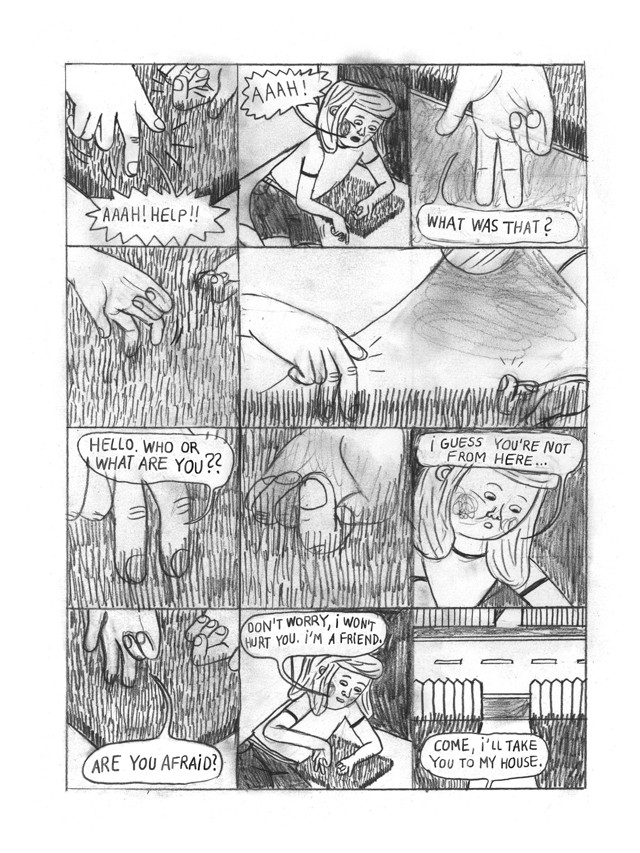
When you draw, do you find you’re trying to portray things as they are, or you’re trying to create something, with a purpose in mind?
It’s a little bit of both. I mean, most of the times I’m not really aware of the process, like when I’m making drawings or sketches; most of the time I’m surprised by what they’re telling me, and then that’s often a trigger to start to work on a project. It becomes more conscious, like, “what is this actually about?”
I also don’t really like to draw real places or people. It’s hard and a little bit boring. I try to keep it very open and then I automatically focus more on like, feelings, like atmospheres.
And yet the book has such a wonderful narrative structure to it. How do you think about the structure of a story, if that’s not your main goal when you’re making something?
Well, with both of my books and the book I’m working on now, always have this need to know what the story is about and how am I going to tell this story. But then you have this huge mountain in front of you and it’s really hard to get started.
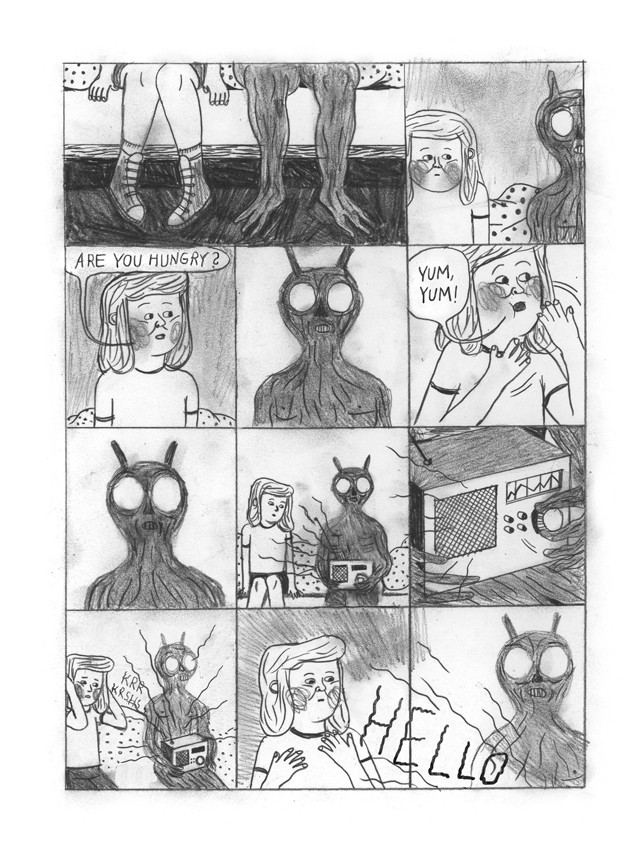
With Earthling, in the beginning, I focused on the little scenes, and then one scene and then the next one, and then it started to develop a kind of rhythm, but of course I collected a lot of materials, and ideas. I threw out a lot of stuff, but I always had to stop and think about it, if this was really working.
I think it’s not so good to worry about certain rules of storytelling. You just have to make sure it’s readable and transmits what you want to transmit. That’s the cool thing about comics, there are no rules, you know?
When I quit art school and I moved to Berlin, and then I had this book out, I didn’t really have a sense of what I was doing, so I thought I had to keep on working and get better and do more. It was great and I got a lot of benefit from it, but I kind of lost focus. At a point I was like, what is driving me? Why am I so anxious? So the last year has been a little bit more of a reorientation, to find a value, to recognize why am I doing it, why I love it that much.
Why are you doing it? Do you have an answer?
Not really, but I’m more comfortable. I don’t blame myself if I don’t get shit done anymore.

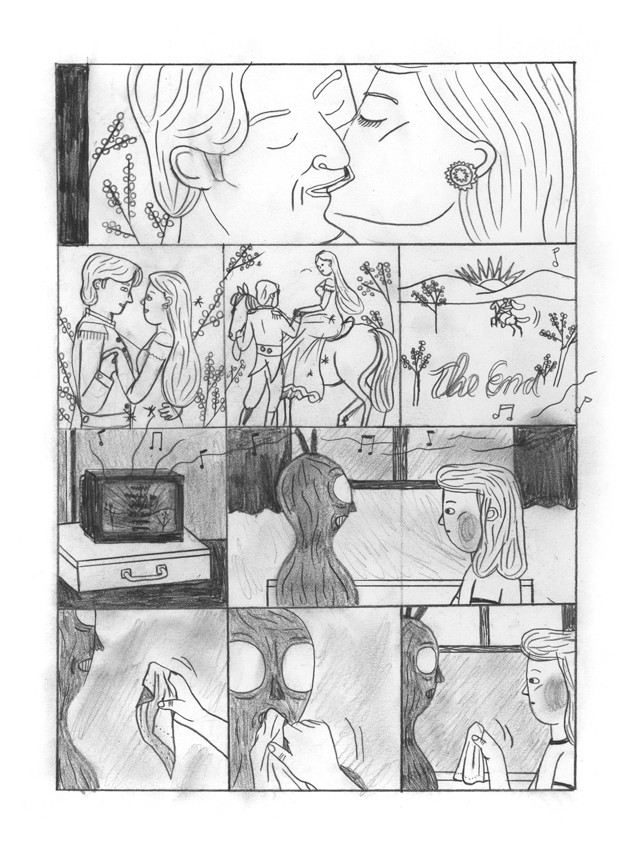
So you made comics on your own, self-publishing zines with friends, but only entered the community through publishing your book? What was that like?
It feels still a little bit like two different worlds, when it comes to working with publishers, having a book out, compared to self-publishing and doing small projects and collaborating with others. It’s starting to get a little bit too professional in a way. I’m not against it, and I think it’s great to be invited to different places, like fairs, or literature festivals, or even more artsy things, and that of course happens through publishers who do a lot of publicity for graphic novels. But the public always needs to put things into a certain box to understand it, you know, and you have to sell it somehow.
It’s the same in North America, but what does that box look like in Germany?
I think it’s really become very hip, the term ‘Graphic Novel.’ The other day I went to a random café and there was a bunch of graphic novels; even my book was there, and it was like, “What’s going on? This is weird.”
People understand ‘graphic novel’ as something other than comics. So in Germany the graphic novels that work best are mostly related to historical things, or autobiographic things, some famous person — only fiction doesn’t really work yet. It opens doors, of course, and I’ve been lucky too, there are people who like my book, but it’s still in a weird space.
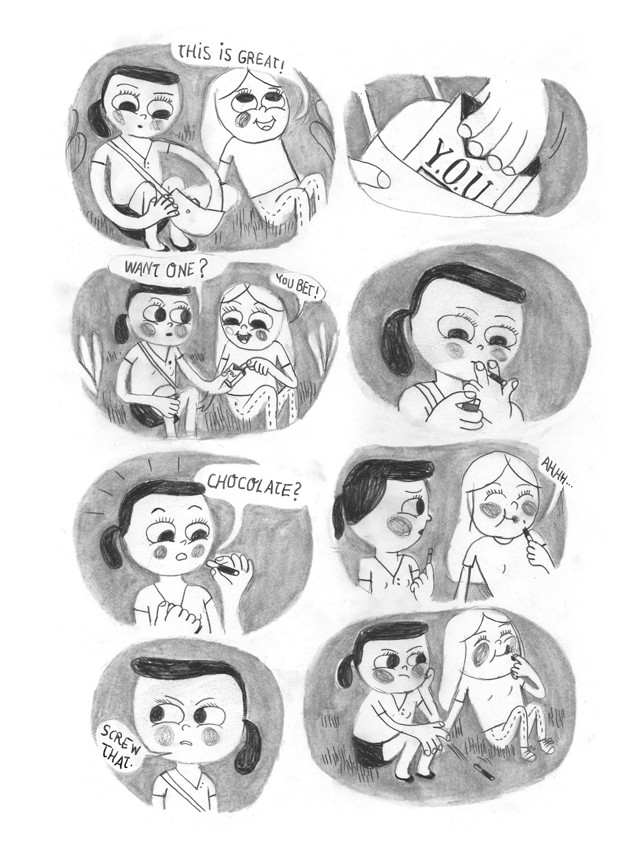
Yeah absolutely. It would challenge someone who isn’t used to reading comics yet on a bunch of different levels, because it’s fiction, and a playful subject matter to have an alien, but very sexual and dark, too. And then you draw only in pencil, which might not be seen as having a professional appearance in the end, especially seeing smudges on the page.
Yeah, people are very confused by it.
But it’s beautiful! And it does achieve the atmosphere you were talking about; even a hard line is not that hard, there’s always some texture, some depth to it. People who make comics or are invested in the medium will love it, but it might not fit the ‘professional’ box for the public.
Yeah, but I really don’t have so much expectation that, like, “everyone should read my book.” I’m happy about anyone who decides to read it. What is funny is talking about the book, because it was first published in Germany in 2011, and I realized I’ve never actually read it! Because I made it, it was finished, and I was like, “whoa it’s done,’ and then I never actually had the experience of reading it. But it’s really good to have this new relationship with it; I had to make this new cover, and I’m presenting it to a new public and a new audience. It’s really fun.
Can you explain a little more what you meant by finding the rhythm of the story for Earthling?
A story always has a kind of rhythm, I think — like in movies, for example, but in comics it’s a different rhythm cause you read them. If you look at Earthling, it’s only very short scenes and they are mostly divided by 1-page drawings or thumbnails. The pages are very dense and have the same rhythm since the panels have the same size and so on. But then I try to open it up by only doing one drawing per page or using a larger panel. That means rhythm to me while reading.
In your presentation the other night, you played music along with your slideshow, and the book is full of sounds — the radio static, shattering of glass, and the tick of a clock all take the story in a new direction when they appear. Why is music a good way to describe or enhance comics?
For the lectures I just find it’s more comforting for me and the audience. I felt it’s awkward to have a reading when my comics don’t have many words in them. So music can enhance the atmosphere and add a nice extra layer.
[At your Toronto launch] you said, “He’s in her head, so he’s there,” about the alien, and then you were discussing the sister’s childhood place, and the mother’s alternate reality haunting her — tell me a little bit more about how imagined things can be real.
The stories in the book are all told from the character’s perspectives, so for them it is real in that moment. I find it’s interesting that often you have these moments on average days where you kind of feel that there’s something else, that maybe dream and reality are not so far away from each other, and that imagination can have a huge impact on our reality. That’s why I enjoy David Lynch movies so much, I guess. As a reader…well, you might question it, but you have no other choice as to take it as it is.
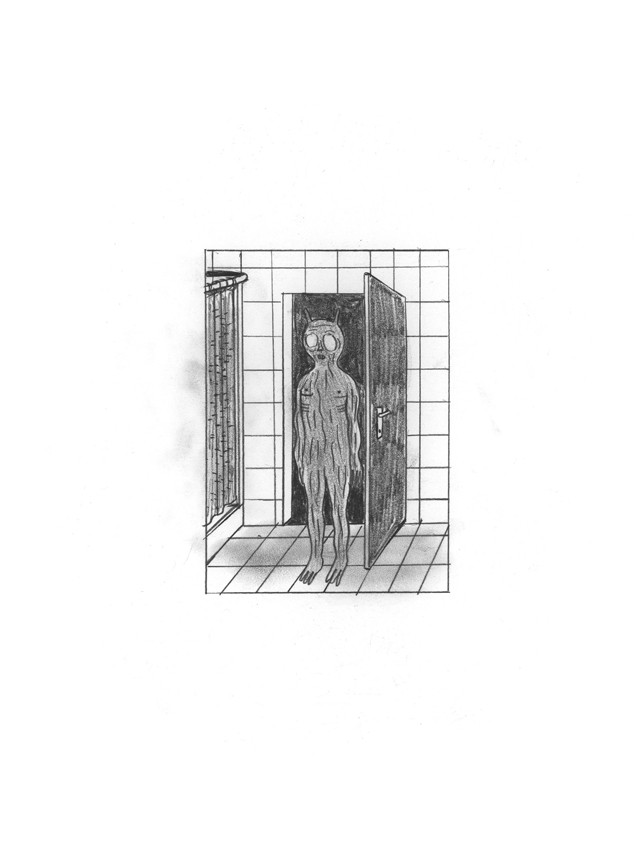
This conversation has been condensed and edited.
Georgia Webber is a comics artist living in Toronto, where she is the Comics Editor for carte blanche and the Guest Services Coordinator for the Toronto Comic Arts Festival. She is most often making work about her vocal disability. Georgia wants you to consider your voice. See how at georgiasdumbproject.com.